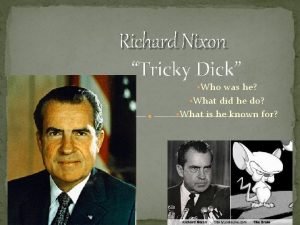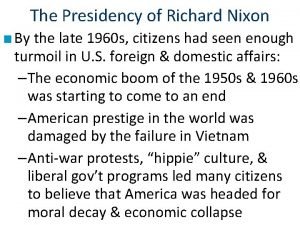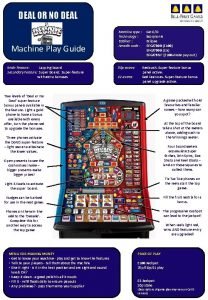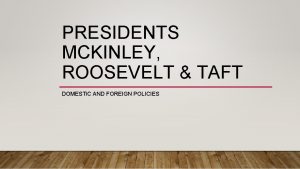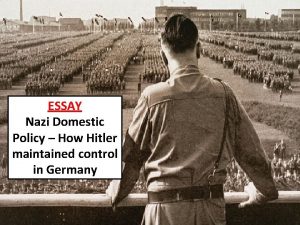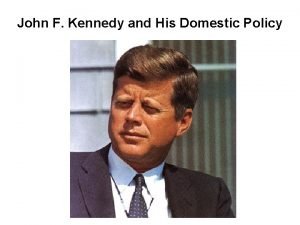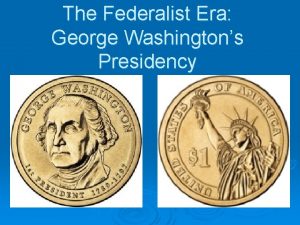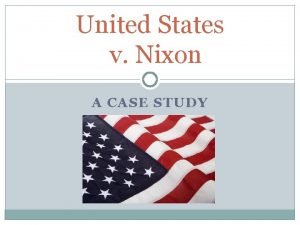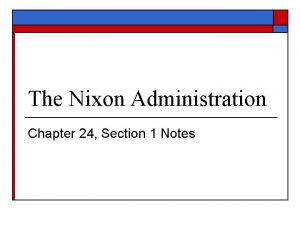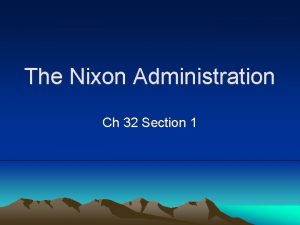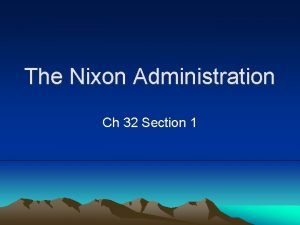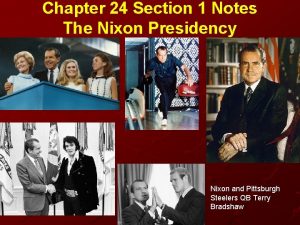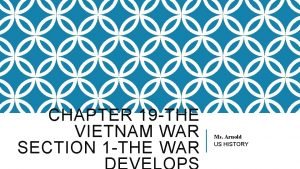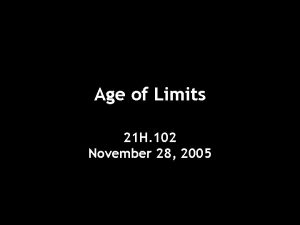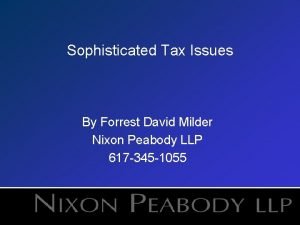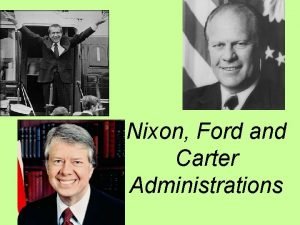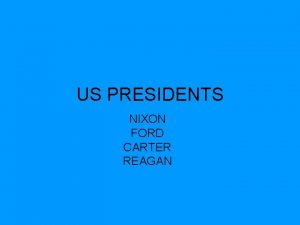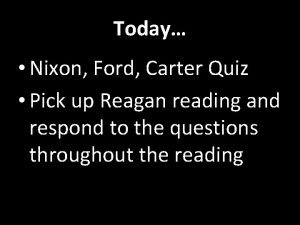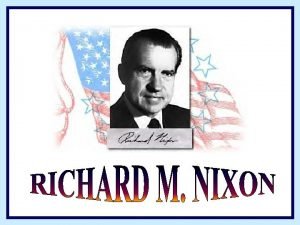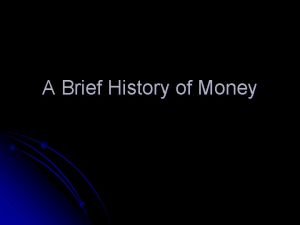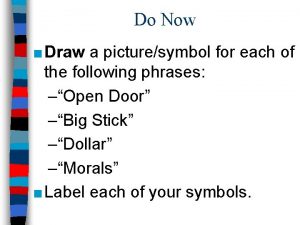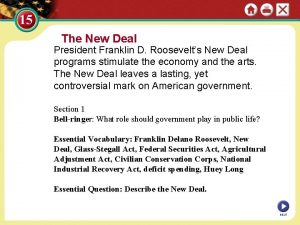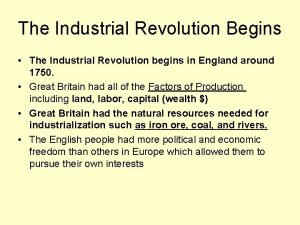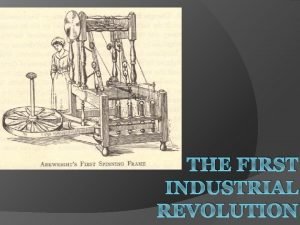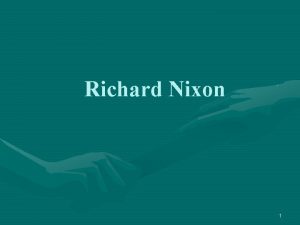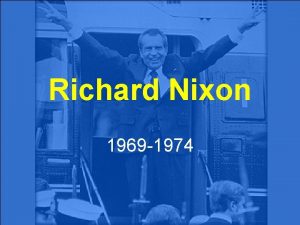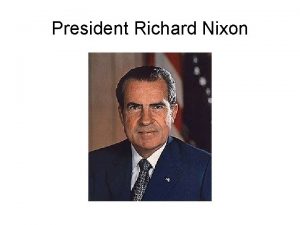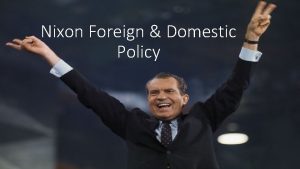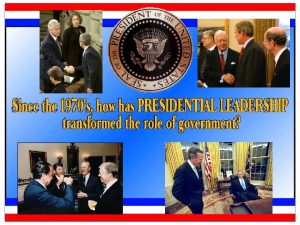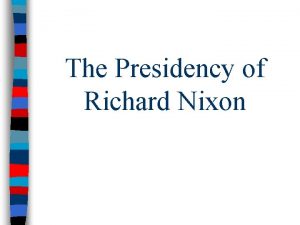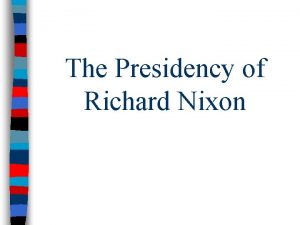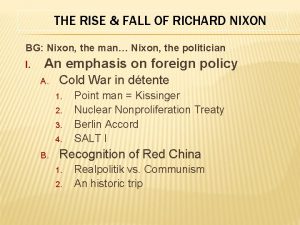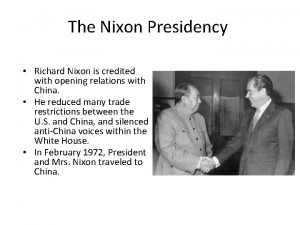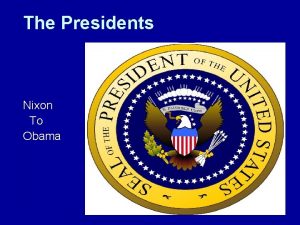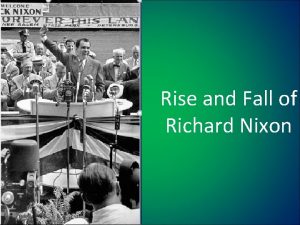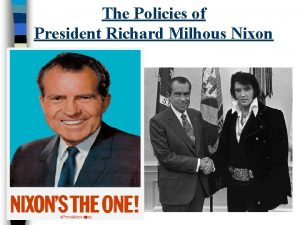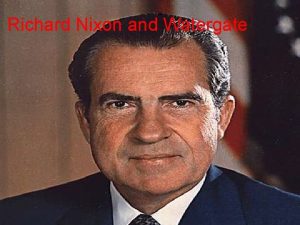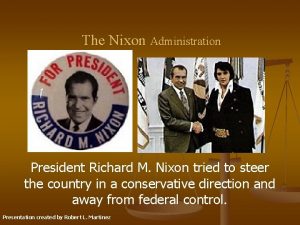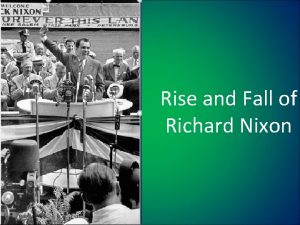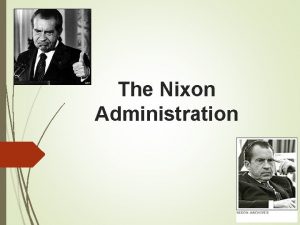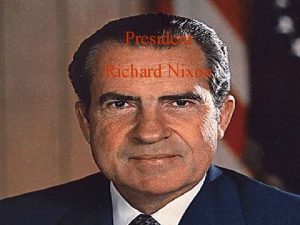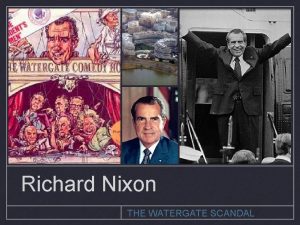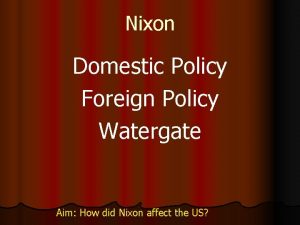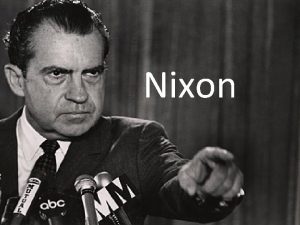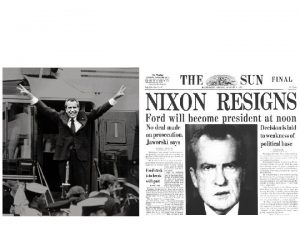How did Richard Nixon deal with domestic policy



















































- Slides: 51

How did Richard Nixon deal with domestic policy and how did his policies evolve?

Republican Richard Nixon, who had served as Eisenhower’s Vice President, won the 1968 election by promising “peace with honor” in Vietnam and “law and order” at home. The latter, clearly a reaction to the recent racial riots and the 1960 s counterculture, was aimed at Southern whites, who had traditionally voted Democratic. It was Nixon’s “Southern Strategy” and it began a resurgence of Republican strength in the South.

After a divisive election, however, Nixon called for unity. In domestic policy he began with moderation, not a hard conservatism. He tried to appeal to a wider swath of Americans, not just the Republican core business base. Nixon appointed a relatively moderate cabinet Nixon meets with Elvis

Nixon proposed welfare reform known as the Family Assistance Plan. It provided more money for recipients initially but mandated that recipients must undertake job training and, upon completion, take any reasonable job offer. It withdrew aid for noncompliance. Both liberals and conservatives found something to like and dislike in the proposal. In the end, the plan did not win enough support to pass and welfare reform failed.

Earth Day, 1970

Nixon after signing National Environmental Policy Act (NEPA) on the first day of 1970 In trying to win the environmental vote, Nixon helped create the Environmental Protection Agency (EPA) and signed numerous environmental protection bills, including major legislation fighting air and water pollution, protecting endangered wildlife, and expanding parks and nature preserves.

There were events that brought the nation together, including Apollo 11, which landed on the moon in July, 1969

Israeli occupied territories in light blue (left) Despite Nixon’s attempts at moderation in domestic policy, events soon challenged him. In 1973 several Arab nations attempted to regain land lost to Israel in 1967’s Six Day War, which soon had severe implications for the American economy.

When the US helped Israel win the so-called Yom Kippur War of 1973, the Arab-dominated Organization of Petroleum exporting Countries (OPEC) embargoed oil sales to the US. Because the US was so dependent on oil imports, this embargo began the infamous Energy Crisis of the 1970 s OPEC countries in red (below)

While the official embargo was shortlived, the Energy Crisis largely continued throughout the 1970 s. The higher cost of fuel led to inflation, which challenged Nixon and his successors in the 1970 s. Nixon tried unsuccessfully to battle inflation with price controls.

As the Energy Crisis and inflation grew, Nixon became more conservative in his policies. He embraced what he called the New Federalism, reducing federal mandates and regulations on states. He also proposed Revenue Sharing, giving local and state governments block grants and more say in the spending of federal funds Nixon signs “Revenue Sharing” bill, 1972

As Nixon grew more conservative, he spoke of the “Silent Majority, ” those he believed were law abiding citizens who disliked liberalism and the cultural turmoil. Unspoken were those who resisted African. American civil rights. While Nixon had earlier supported such rights, he increasingly resisted federally-mandated school busing to achieve desegregation. It was again part of his “Southern Strategy”

Abortion increasingly divided Americans. On January 23, 1973 – the same day of LBJ’s death – The Supreme Court announced its Roe vs. Wade decision.

“Pro-Life” vs. “Pro -Choice”

What did Nixon believe about foreign policy and what did he accomplish outside of Vietnam?

Nixon worked with his National Security Advisor Henry Kissinger to craft a “Realpolitik” foreign policy. This meant a cold calculation of what was in America’s best national interest and less consideration of broader ideology or morality.

Despite his long career as a rabid anti-communist, Nixon negotiated a withdrawal of American troops from Vietnam and pursued détente with the Soviet Union. Nixon became the first president since WWII to visit Soviet Union, here with Soviet leader Leonid Brezhnev in 1972

Nixon and Brezhnev signed the Strategic Arms Limitation Talks (SALT) SALT and subsequent treaties limited ICBM’s (left) and ABMs (right)

To make the Soviet Union more open to détente, Nixon made overtures to the People’s Republic of China. Nixon knew that relations were tense between the USSR and the PRC.

Nixon greets Mao Zedong on historic trip to PRC, 1972

Nixon wins 1972 in landslide over George Mc. Govern

What was the Watergate Scandal and how did it unfold?

“The Watergate” in Washington, home to the Democratic National Committee The Watergate burglars

Bob Woodward (center, right) and Carl Bernstein (center, left) of the Washington Post began to uncover connections to CREEP. Committee to Reelect the President (CREEP)

As the scandal unfolded, Woodward and Bernstein continued to publish revelations about White House connections. They cited an anonymous informant they termed “Deep Throat. ” It was later revealed to be Mark Felt, the #2 man at FBI.

Senate Watergate Hearings As a trial of the burglars proceeded, the Senate began an investigation into the break-in and White House connections. Nixon, still denying any personal connections to the break-in, appointed his own special prosecutor to get to the bottom of it all.

John Dean H. R. Haldeman John Ehrlichman As the investigations proceeded, and evidence against the White House grew, Nixon continued to claim that he had no knowledge. With evidence growing, however, he did fire several top aides implicated. These included White House Counsel John dean (left, above), who was the first to testify before the Senate that Nixon knew of the break-in.

When the Senate Watergate Committee learned that there had been a secret White House taping system, the Senate demanded the tapes. Nixon refused, citing “Executive Privilege”

When Nixon’s own special prosecutor also demanded access to the tapes, Nixon again refused and fired the prosecutor. When he then appointed a new special prosecutor who also demanded access to the tapes, Nixon fired him as well. These firing became famous as the “Saturday Night Massacre”

Nixon attempts to release just edited transcripts in media frenzy, but this did not satisfy investigators

Congress began considering impeachment

United States of America vs. Richard Nixon

“Smoking Gun Tape” proves Nixon complicit in cover-up

Nixon announces resignation for the next day, August 9, 1974

What problems hampered the presidency of Gerald Ford?

Spiro Agnew Gerald Ford As the Watergate crisis had unfolded, Nixon’s Vice President Spiro Agnew had resigned admitting tax evasion. Nixon had then appointed Michigan Congressman and House Minority Leader Gerald Ford as his new vice president. When Nixon resigned, therefore, Ford, who had only been vice president briefly, became president. Ford served through the 1976 election.

Ford struggled with a stagnant economy and with persistent inflation His slogan “Whip Inflation Now – or “win” – seemed a weak response. The government seemed inept in addressing the economic woes

Ford made two key decisions: #1) the US should not resume defending South Vietnam when North Vietnam began its renewed assault, and 2) Nixon deserved a pardon, which Ford thought would help the nation get past the Watergate scandal. Unfortunately for Ford, the pardon made him appear complicit, a possible quid-pro-quo with Nixon. With the nation appearing weak and the economy still suffering, Ford became increasingly unpopular.

The nation had only one bright spot: Bicentennial Celebration, July 4, 1976

What characterized the presidency of Jimmy Carter?

In 1976 former Georgia Democratic Governor Jimmy Carter defeated Ford by appearing an outsider, a fresh face not from Washington and a man who would always tell the truth. Carter served through the 1980 election.

Carter created two new departments, the Department of Education (left) and the Department of Energy (right), but Carter had a bad relationship with Congress, annoying many veteran lawmakers. The economy took a turn for the worse when the ongoing Energy Crisis got worse and inflation picked up even more. Like Ford, Carter appeared impotent.

By the late 1970 s, people spoke of “Stagflation, ” the odd combination of high employment and high inflation at the same time

Racial tensions remained high with the battle over busing continuing and the battle over affirmative action beginning. Protest against court-ordered busing Bakke vs. University of California

The battle over ratification of the Equal Rights Amendment (ERA), which ultimately failed, divided many Americans

From left: Egyptian leader Sadat, Carter, Israeli leader Begin In foreign policy, Carter had one major success: the Camp David Accords. In exchange for Israel giving the Sinai back to Egypt, Egypt recognized Israel and signed a peace treaty.

But Carter had other problems. The Soviets invaded Afghanistan, and the US began covert support of Islamic opposition

Détente with the USSR broke down as the US boycotted 1980 the Summer Olympics in Moscow, protesting the Afghanistan invasion, and the Soviets retaliated by boycotting the 1984 Summer Olympics in Los Angeles.

To make matters worse, a growing Islamic fundamentalist movement led by the cleric Aytollah Ruhollah Khomeini toppled the pro-American government of Iranian leader Shah Reza Pahlavi Ayatollah Ruhollah Khomeini

Militants seize US embassy in Iran and hold hostages Failed American rescue attempt

The Iranian Hostage Crisis went on for over a year, making Carter appear weak. It all led to Carter’s defeat in 1980 to former California Governor Ronald Reagan. To spite Carter, the Iranians released the hostages on the day of Reagan's inaugural in 1981.
 Tricky dick: the rise and fall and rise of richard m. nixon
Tricky dick: the rise and fall and rise of richard m. nixon Richard nixon
Richard nixon Deal or no deal machine
Deal or no deal machine Asset deal vs share deal
Asset deal vs share deal William h taft domestic policy
William h taft domestic policy Domestic policy of hitler
Domestic policy of hitler Dwight d eisenhower domestic policy
Dwight d eisenhower domestic policy Napoleon bonaparte domestic policies
Napoleon bonaparte domestic policies Domestic policy definition
Domestic policy definition Thomas jefferson domestic policy
Thomas jefferson domestic policy Hatshepsut family
Hatshepsut family Kennedy's domestic program
Kennedy's domestic program Domestic policy
Domestic policy George washingtons domestic policy
George washingtons domestic policy Power in looking for richard
Power in looking for richard Qin map
Qin map United states v. nixon significance
United states v. nixon significance Chapter 24 section 1 the nixon administration answers
Chapter 24 section 1 the nixon administration answers Chapter 32 section 1 the nixon administration
Chapter 32 section 1 the nixon administration Chapter 32 section 1 the nixon administration
Chapter 32 section 1 the nixon administration Shorts maneuver spleen
Shorts maneuver spleen Vanderbilt student loans
Vanderbilt student loans Chapter 24 section 1 the nixon administration
Chapter 24 section 1 the nixon administration Chapter 19 the vietnam war
Chapter 19 the vietnam war Nixon peabody boston
Nixon peabody boston Jerry nixon microsoft
Jerry nixon microsoft Nixon safety
Nixon safety Ascites precox ppt
Ascites precox ppt Vicki nixon
Vicki nixon Nixon china
Nixon china Nixon leaving white house
Nixon leaving white house David milder
David milder Regents of university of california v bakke
Regents of university of california v bakke Características de la educación física
Características de la educación física Nixon ford carter reagan
Nixon ford carter reagan 882
882 Nixon quaker religion
Nixon quaker religion Nixon tally stick download
Nixon tally stick download How old was richard ramirez when he got caught
How old was richard ramirez when he got caught History of photography assignment
History of photography assignment Moral diplomacy
Moral diplomacy Why did the
Why did the Chapter 14 section 1 the search for spices
Chapter 14 section 1 the search for spices Horse gives us
Horse gives us Typical composition of untreated domestic wastewater
Typical composition of untreated domestic wastewater Soil conservation and domestic allotment act
Soil conservation and domestic allotment act Domestic system
Domestic system Soil conservation and domestic allotment act
Soil conservation and domestic allotment act Domestic system
Domestic system Domestic rainwater harvesting
Domestic rainwater harvesting Strategy is
Strategy is Mao domestic policies
Mao domestic policies
